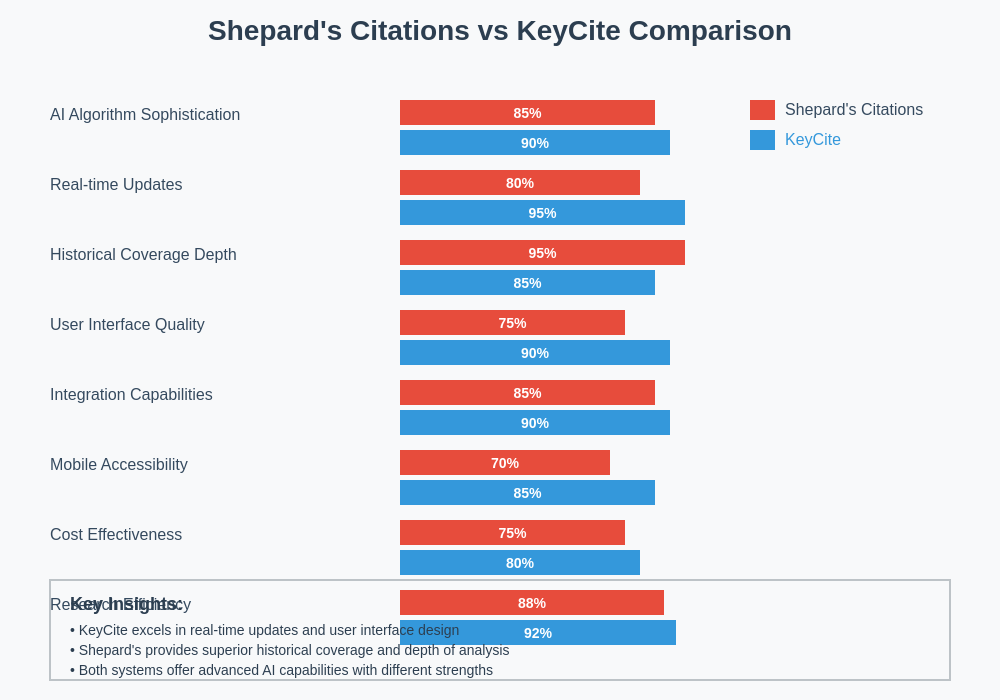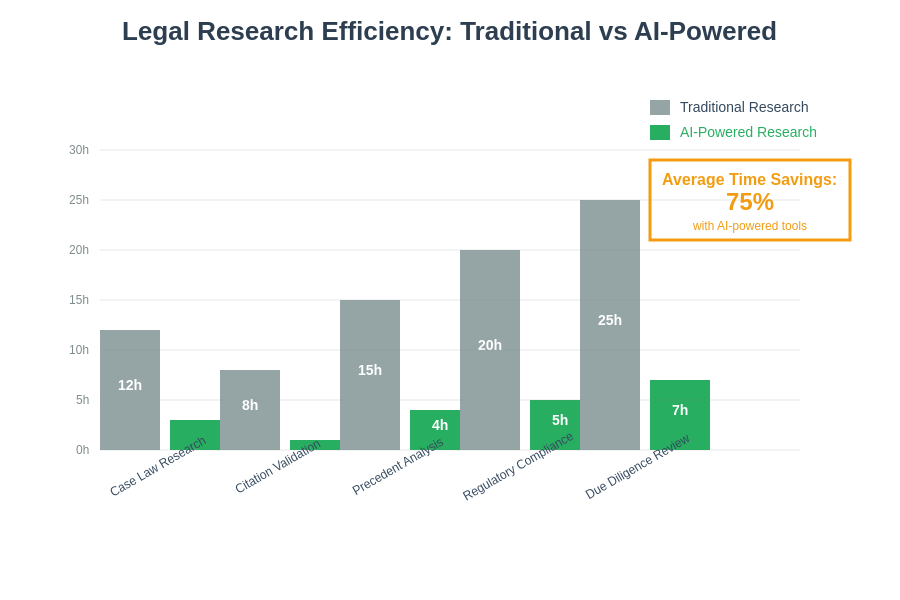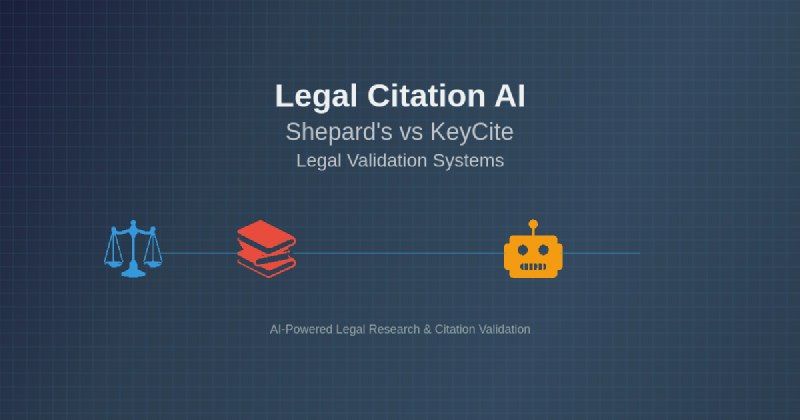The legal profession has undergone a profound transformation with the integration of artificial intelligence into citation validation and legal research systems. At the forefront of this revolution stand two dominant platforms that have redefined how legal professionals verify case law authority and conduct comprehensive legal research. Shepard’s Citations and KeyCite represent the pinnacle of legal validation technology, each employing sophisticated artificial intelligence algorithms to analyze vast databases of legal precedents, statutes, and regulatory materials to provide attorneys, judges, and legal scholars with unprecedented accuracy in citation verification and legal authority validation.
Explore the latest developments in AI technology to understand how artificial intelligence continues to reshape professional industries beyond traditional boundaries. The integration of AI into legal research represents a fundamental shift in how legal professionals approach case preparation, brief writing, and judicial decision-making, transforming centuries-old practices through the application of cutting-edge machine learning and natural language processing technologies.
The Evolution of Legal Citation Validation
The traditional approach to legal citation validation required extensive manual research through physical law libraries, laborious cross-referencing of case law, and time-consuming verification of legal precedents that could span decades of judicial decisions. This manual process was not only inefficient but also prone to human error, potentially leading to the citation of overruled cases, outdated statutes, or misinterpreted legal principles that could undermine the strength of legal arguments and compromise the integrity of legal proceedings.
The emergence of computerized legal research systems in the late twentieth century marked the beginning of a technological revolution that would eventually culminate in today’s sophisticated AI-powered citation validation platforms. These early systems laid the groundwork for the advanced algorithms that now power Shepard’s Citations and KeyCite, enabling legal professionals to conduct comprehensive citation analysis with unprecedented speed and accuracy while maintaining the highest standards of legal research integrity.
The integration of artificial intelligence into legal citation systems has created an ecosystem where machine learning algorithms continuously analyze new court decisions, legislative changes, and regulatory updates to provide real-time validation of legal authorities. This dynamic approach ensures that legal professionals have access to the most current and accurate information available, significantly reducing the risk of citing invalidated or superseded legal precedents.
Shepard’s Citations: The Pioneer in Legal Validation
Shepard’s Citations, originally developed by LexisNexis, established the foundational principles of legal citation validation that continue to influence modern legal research methodologies. The system’s innovative approach to tracking the treatment of legal authorities through subsequent court decisions created a comprehensive network of legal precedents that enables researchers to understand not only the current validity of a particular case or statute but also its broader impact on the development of legal doctrine.
Discover advanced AI capabilities with Claude to enhance legal research workflows with sophisticated reasoning and analytical capabilities that complement traditional citation validation systems. The integration of multiple AI platforms creates a comprehensive research environment that supports every aspect of legal analysis from initial case discovery through final argument preparation.
The artificial intelligence algorithms that power modern Shepard’s Citations employ natural language processing to analyze judicial opinions, identifying explicit and implicit references to legal precedents while categorizing the nature of such citations according to their legal significance. This sophisticated analysis enables the system to distinguish between cases that merely mention a precedent in passing and those that provide substantial analysis or criticism of the cited authority.
Shepard’s Citations utilizes advanced machine learning techniques to continuously refine its understanding of legal relationships between cases, statutes, and regulations. The system’s AI algorithms analyze linguistic patterns in judicial opinions to identify subtle indicators of judicial approval or disapproval that might not be immediately apparent to human researchers. This deep analysis capability enables Shepard’s to provide nuanced insights into the strength and reliability of legal precedents.
The platform’s citation analysis extends beyond simple validation to provide comprehensive treatment analysis that reveals how courts have interpreted and applied specific legal principles over time. This longitudinal analysis capability enables legal professionals to understand the evolution of legal doctrine and predict potential future developments in specific areas of law.
KeyCite: Thomson Reuters’ Advanced Legal Intelligence
KeyCite, developed by Thomson Reuters for the Westlaw platform, represents a significant advancement in legal citation validation technology through its implementation of sophisticated artificial intelligence algorithms designed to provide comprehensive analysis of legal authorities with enhanced accuracy and depth. The system’s approach to citation validation incorporates advanced machine learning techniques that analyze not only the explicit citations within judicial opinions but also the contextual relationships between legal concepts and principles.
The KeyCite system employs proprietary artificial intelligence algorithms that continuously monitor legal developments across multiple jurisdictions to provide real-time updates on the status of legal authorities. This dynamic monitoring capability ensures that users receive immediate notification when courts issue decisions that affect the validity or treatment of previously established legal precedents, enabling proactive case management and research strategy adjustment.
KeyCite’s artificial intelligence engine analyzes the semantic content of judicial opinions to identify substantive legal analysis that may impact the precedential value of cited authorities. This deep content analysis enables the system to provide more nuanced citation validation that goes beyond simple positive or negative treatment indicators to reveal the specific legal principles that courts have addressed in their analysis of particular precedents.
Comparative Analysis of AI Implementation
The artificial intelligence implementations in both Shepard’s Citations and KeyCite represent sophisticated approaches to natural language processing and legal concept recognition, yet each system employs distinct methodological approaches that reflect different philosophical perspectives on legal research and citation validation. Understanding these differences enables legal professionals to make informed decisions about which platform best serves their specific research needs and practice requirements.
Shepard’s Citations emphasizes comprehensive historical analysis through its AI algorithms, providing extensive coverage of how legal precedents have been treated across different jurisdictions and time periods. The system’s machine learning capabilities excel at identifying patterns in judicial decision-making that reveal the long-term trajectory of legal doctrine development, making it particularly valuable for constitutional law research, appellate practice, and academic legal scholarship.
KeyCite’s artificial intelligence implementation focuses on providing immediate practical insights through its sophisticated analysis of current legal developments and their potential impact on existing legal authorities. The system’s algorithms are optimized for real-time analysis and rapid response to legal developments, making it especially valuable for litigation support, transactional practice, and regulatory compliance work.

The technological architectures underlying these systems reflect fundamental differences in approach to legal information processing and user interface design. While both platforms employ advanced artificial intelligence, their implementations serve different aspects of legal research workflow optimization and professional practice enhancement. The comparative analysis reveals that KeyCite demonstrates superior performance in real-time updates and user interface design, while Shepard’s Citations excels in historical coverage depth and comprehensive precedent analysis.
Advanced Features and Capabilities
Both Shepard’s Citations and KeyCite have evolved to incorporate advanced artificial intelligence features that extend beyond traditional citation validation to provide comprehensive legal research support. These enhanced capabilities include predictive analytics, trend analysis, and automated research assistance that leverage machine learning algorithms to anticipate researcher needs and provide proactive research guidance.
Shepard’s Citations has integrated advanced visualization tools that employ artificial intelligence to create dynamic representations of legal relationship networks, enabling researchers to identify patterns and connections that might not be apparent through traditional text-based analysis. These visualization capabilities are particularly valuable for complex litigation involving multiple legal theories or extensive case law development.
KeyCite has implemented sophisticated alerting systems that utilize artificial intelligence to monitor legal developments relevant to specific cases, legal principles, or practice areas. These intelligent monitoring capabilities enable legal professionals to stay informed about relevant legal developments without requiring continuous manual monitoring of multiple information sources.
The integration of artificial intelligence into document analysis capabilities has enabled both systems to provide enhanced research efficiency through automated identification of relevant legal authorities within large document collections. This capability is particularly valuable for due diligence work, regulatory compliance analysis, and comprehensive legal research projects that involve extensive documentation review.
Enhance your research capabilities with Perplexity for comprehensive information gathering and analysis that complements specialized legal research platforms. The combination of general-purpose AI research tools with specialized legal databases creates a powerful research ecosystem that supports thorough legal analysis.
Accuracy and Reliability Considerations
The accuracy and reliability of AI-powered legal citation systems represent critical factors in professional legal practice, where errors in citation validation can have significant consequences for case outcomes, professional reputation, and client interests. Both Shepard’s Citations and KeyCite employ multiple validation mechanisms and quality control processes to ensure the highest possible accuracy in their citation analysis and legal authority validation.
Shepard’s Citations utilizes a multi-layered verification process that combines automated artificial intelligence analysis with human editorial oversight to ensure accuracy in citation validation and treatment analysis. This hybrid approach leverages the efficiency of machine learning algorithms while maintaining the nuanced understanding and quality control that human legal experts provide in complex analytical situations.
KeyCite implements advanced error detection algorithms that continuously monitor the system’s analysis results for potential inconsistencies or anomalies that might indicate processing errors. These quality assurance mechanisms include cross-validation against multiple data sources, temporal consistency checking, and logical relationship verification to ensure the reliability of citation validation results.
Both systems maintain extensive audit trails that enable users to understand the basis for citation validation decisions and treatment analysis conclusions. This transparency in algorithmic decision-making supports the professional responsibility requirements that govern legal research and citation practices in most jurisdictions.
Integration with Modern Legal Practice
The integration of AI-powered citation validation systems into contemporary legal practice workflows has fundamentally transformed how legal professionals approach research, case preparation, and argument development. These systems now serve as essential infrastructure for modern legal practice, supporting everything from initial case assessment through appellate brief preparation and judicial decision-making.
Shepard’s Citations has developed extensive integration capabilities with popular legal document preparation systems, enabling seamless citation validation during the document drafting process. This integration reduces the likelihood of citation errors while streamlining the research workflow for busy legal professionals who must balance thoroughness with efficiency in their practice.
KeyCite offers sophisticated API integration capabilities that enable law firms and legal departments to incorporate citation validation directly into their document management systems, case management platforms, and client communication tools. This deep integration capability supports comprehensive quality control processes while maintaining workflow efficiency.
The mobile accessibility of both platforms has enabled legal professionals to conduct citation validation and legal research from any location, supporting the increasingly distributed nature of modern legal practice. This mobility is particularly valuable for court appearances, client meetings, and travel-intensive litigation work.
Economic Impact and Cost Considerations
The economic implications of implementing AI-powered legal citation systems extend beyond simple subscription costs to encompass broader considerations of research efficiency, accuracy improvements, and risk mitigation that affect the overall economics of legal practice. Understanding these economic factors enables legal organizations to make informed decisions about technology investment and resource allocation.
Shepard’s Citations provides significant value through its comprehensive historical coverage and deep analytical capabilities, particularly for practices that require extensive precedent research and long-term legal trend analysis. The system’s efficiency in handling complex research projects can result in substantial time savings that translate directly into improved profitability and client service quality.
KeyCite offers compelling economic value through its real-time monitoring capabilities and efficient current awareness features that enable legal professionals to stay informed about relevant legal developments without requiring extensive manual monitoring time. This efficiency is particularly valuable for high-volume practices and organizations with extensive regulatory compliance requirements.

The quantitative analysis of research efficiency improvements demonstrates that AI-powered citation systems can reduce traditional research time by an average of 75% across common legal research tasks. The most significant time savings occur in citation validation and due diligence review processes, where automated verification capabilities eliminate much of the manual cross-referencing traditionally required for thorough legal research.
The return on investment for AI-powered citation systems typically becomes apparent through improved research accuracy, reduced research time, enhanced client service quality, and decreased risk of citation-related professional liability issues. These benefits compound over time as legal professionals become more proficient in leveraging the advanced capabilities of these systems.
Security and Confidentiality Considerations
The security and confidentiality requirements of legal practice demand the highest standards of data protection and access control in AI-powered citation systems. Both Shepard’s Citations and KeyCite have implemented comprehensive security frameworks designed to protect sensitive legal information while enabling efficient research and collaboration capabilities.
Shepard’s Citations maintains enterprise-grade security infrastructure that includes advanced encryption, multi-factor authentication, and comprehensive audit logging to ensure the confidentiality and integrity of legal research activities. The system’s security framework complies with relevant professional responsibility requirements and industry security standards.
KeyCite implements sophisticated access control mechanisms that enable organizations to maintain appropriate separation between different client matters while facilitating efficient research collaboration within authorized teams. These security capabilities are particularly important for large law firms and legal departments that handle sensitive matters across multiple practice areas.
Both platforms provide comprehensive privacy controls that enable users to manage their research history and personal information according to professional responsibility requirements and organizational policies. These privacy features support compliance with applicable data protection regulations while maintaining research efficiency.
Future Developments and Technological Trends
The continuing evolution of artificial intelligence technology promises to bring even more sophisticated capabilities to legal citation validation and research systems. Emerging developments in natural language processing, machine learning, and predictive analytics are likely to enhance the accuracy, efficiency, and analytical capabilities of both Shepard’s Citations and KeyCite.
Advanced natural language processing capabilities are expected to enable more sophisticated understanding of legal concepts and relationships, potentially allowing citation systems to provide more nuanced analysis of legal precedents and their implications for specific legal questions. These developments could significantly enhance the quality of legal research and analysis.
The integration of predictive analytics into citation validation systems may enable legal professionals to anticipate potential challenges to legal authorities and develop more robust argumentative strategies. This predictive capability could transform how legal professionals approach case strategy development and risk assessment.
Machine learning algorithms are likely to become increasingly sophisticated in their ability to identify patterns in judicial decision-making and predict potential future developments in specific areas of law. This capability could provide valuable strategic insights for litigation planning and legal advice formulation.
The continued development of user interface technologies, including voice recognition and natural language query processing, promises to make these sophisticated research tools more accessible and intuitive for legal professionals at all experience levels. These usability improvements could democratize access to advanced legal research capabilities.
Professional Responsibility and Ethical Considerations
The use of AI-powered legal research tools raises important questions about professional responsibility and ethical obligations that legal professionals must carefully consider in their practice. Understanding these ethical implications is essential for maintaining compliance with applicable professional conduct rules while leveraging the benefits of advanced technology.
The duty of competence in legal representation requires attorneys to understand the capabilities and limitations of the research tools they employ. This understanding includes knowing when AI-powered systems may require human verification or additional research to ensure complete and accurate legal analysis.
Confidentiality obligations may require special consideration when using cloud-based research platforms, particularly for sensitive matters or clients with specific security requirements. Legal professionals must evaluate whether the security measures implemented by these platforms meet their professional responsibility obligations.
The duty to provide zealous representation within legal boundaries requires attorneys to leverage available technology to provide the most effective possible legal services while maintaining appropriate professional judgment and oversight of AI-generated research results.
Conclusion and Strategic Recommendations
The comparison between Shepard’s Citations and KeyCite reveals that both systems represent significant achievements in the application of artificial intelligence to legal research and citation validation. Each platform offers distinct advantages that make it suitable for different types of legal practice and research requirements, and the choice between them should be based on careful consideration of specific practice needs, workflow requirements, and strategic objectives.
Legal professionals and organizations should evaluate these systems based on their specific research patterns, practice areas, client requirements, and integration needs rather than attempting to identify a universally superior platform. The most effective approach may involve utilizing both systems for different types of research or maintaining access to both platforms to ensure comprehensive coverage of legal authorities.
The continued evolution of AI technology in legal research suggests that both platforms will likely continue to enhance their capabilities and introduce new features that further improve the efficiency and accuracy of legal research. Staying informed about these developments and continuously evaluating the effectiveness of chosen research tools represents an important aspect of maintaining competence in modern legal practice.
The investment in advanced citation validation systems should be viewed as essential infrastructure for contemporary legal practice rather than optional technology enhancement. The accuracy, efficiency, and risk mitigation benefits provided by these systems justify their cost for most legal practices, particularly those involved in complex litigation or requiring extensive legal research capabilities.
Disclaimer
This article is for informational purposes only and does not constitute legal advice or professional recommendations. The views expressed are based on publicly available information about legal research technologies and their capabilities. Legal professionals should conduct their own evaluation of these systems based on their specific practice requirements and consult with their organizations’ technology and compliance teams before making implementation decisions. The effectiveness and suitability of these platforms may vary depending on specific use cases, practice areas, and individual organizational requirements.
